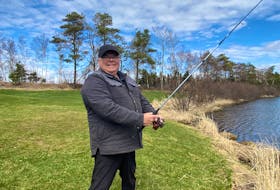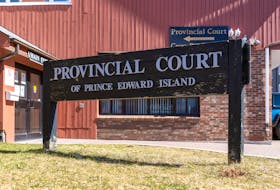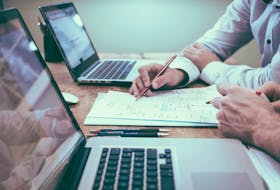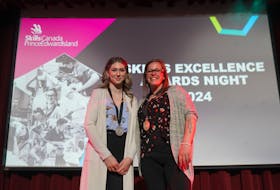TERRACE, B.C. - Robert Pictou's grieving journey for his missing sister has been completed.
But his intense longing to bring her home, to rest in peace in Nova Scotia, hasn't waned.
"For me, for my family, there's no grave to go where my sister is because she's still missing," he said.
Virginia Sue Pictou, from Membertou, N.S. went missing on April 24, 1993, in Maine, after being beaten by her husband and brother-in-law outside a bar.
Police had taken Virginia Sue to hospital, where she was admitted. Virginia Sue left that same night, before being released by doctors, and the loving mother's whereabouts have been a mystery since.
"We just want to bring her home. That's what we've always said," said Pictou, who lives in Terrace, B.C.
"We know she is gone. We just want her home."
Robert and his family testified to the commissioners of the National Inquiry into Missing and Murdered Indigenous Women and Girls (MMIWG) when it was held at Membertou First Nation from Oct. 30-Nov. 1, 2017. In total, 55 family members and survivors testified during the three days of heart-wrenching accounts of lost love ones, sexual assault, and police misconduct.
During their testimony, Virginia Sue's family said they "know" she was killed by her husband and her brother-in-law, who aren't Indigenous, after that night in Maine.
After Virginia Sue was taken to hospital, her husband was arrested. He was released the same night. After Virginia Sue left the hospital, she was never seen again.
Neither man confessed to the crime to the police before they died; however, the family said they've been told by multiple people the brothers told them they committed the crime.
The family also received a copy of a police report which said investigating officers believed the men were responsible for her death and testified they believed Virginia Sue was a victim of domestic violence before her death.
Over the years, Pictou says, they've learned Virginia Sue was also sexually assaulted by her brother-in-law.
"I believe in my heart of hearts it was her husband and brother-in-law who did this to her," said Pictou, who travelled throughout Maine in the 1990s following tips about his sister.
Racism and insensitivity

Over the years, the Pictou family received tips about Virginia being spotted in Canada and the U.S. and had dealings with police in both countries.
Pictou, who is a television host and producer, said interviews with police often were - and still are - rife with racist stereotypes and lack of sensitivity.
When police in Maine appointed a victim's advocate for missing and murdered Indigenous women and girls, and officers began looking at Virginia Sue's case again a few years ago, Pictou said it was a "ray of hope."
That ray of hope was darkened by police actions.
When Virginia Sue's family gathered for a Letting Go ceremony in 2019, marking the 25th anniversary of her disappearance, police showed up to collect DNA samples and do interviews.
"The family, most of us, have always made ourselves available to police," he said. "They didn't need to do that there. They could have just asked."
In another recent instance with U.S. police, an officer who was newly assigned to the case showed one of her daughters the last photo of her mother - taken in hospital after she'd been badly beaten.
"For him, it's a routine matter. But that's where there's the disconnect. I want to ask (the officer), 'Do you understand that's her mother? To you, it's just a file; to us, it's a family member,'" Pictou said, noting they've had similar experiences with Canadian police.
"That's just the way it's always been. Early on in the investigation, we'd hear from police, 'She was drinking,' inferring she's First Nation and she's going to be a drunk."

Good start, no follow
Pictou said the national inquiry itself was "groundbreaking" but questions if any change will result from it.
"The process was fantastic, it was groundbreaking because there was an acknowledgment, as far as the government goes, all the way up to the (federal) government, that there is something systematic, racism, an injustice that is going on," he said.
"I was fortunate to interview (one of the inquiry commissioners) Michèle Audette...I asked her what was the next steps of the inquiry. She said that would be having the reports turned over and have RCMP investigate. But that didn't happen. It was stopped."
The final report of the inquiry, Reclaiming Power and Place, was released on June 3, 2019, and includes 231 Calls for Justice. These recommendations include police services being trained to understand "culturally appropriate and trauma-informed practices," strategies created which focus on the prevention of violence against women, and an action plan created by the federal government.
Pictou questions if lack of funding is what caused the government to not investigate police or move forward implementing the calls.
"It was good that it was started, but there's no follow-up. It's going to be like the inquiry into residential schools, where the inquiry (action to be taken) and nothing was done," he said.
"Unfortunately, it seems Canada, in general, can't follow through in certain things...that leaves families with another level of mistrust. It's heart-crushing. You feel helpless because there's never any conclusion to anything."
Local action, federal lag

Chief Annie Bernard-Daisley also questions the federal Liberal government's lack of action since the final report was released.
We'koqma'q first female chief, elected in October 2020, Bernard-Daisley is also president of the Nova Scotia Native Women's Association.
Like many in Unama'ki and across Turtle Island, Bernard-Daisley has had two family members tragically die under suspicious circumstances. One is Cassidy Bernard, whose ex-boyfriend is currently awaiting trial on second-degree murder charges in relation to her death. The other is Cassidy's older brother Carlyle Denny, whose 2008 death has always been viewed as suspicious by the family.
Bernard-Daisley's dedication to helping solve the travesty of the high number of missing and murdered is driven by what her family has been through and she said one level of government is acting.
"I don't know if this is a government plan, the Government of Nova Scotia...but I have to thank Premier Stephen McNeil for all the support and services he provided for the Nova Scotia Native Women's Association. Throughout his years of service, he's been nothing but supportive to us as Indigenous women," said Bernard-Daisley, the association's president.
"He's been open, he's been honest, he's been supportive of us, and he's worked with us hands-on in this whole collaborative plan moving forward, as we work on (the strategy for the prevention of) human trafficking and the Calls for Justice."
Over the past year, almost $1.8 million in provincial funding has been awarded to the Nova Scotia Native Women's Association for programs helping at-risk Indigenous women and girls. Many of these strategies aim to address the Calls for Justice.
In February 2020, the provincial Liberals announce $1.4 million be spent yearly for five years to combat human trafficking and sexual violence against women.
Part of this is $750,000 to the Jane Paul Indigenous Women's Centre in Sydney, to be given to the centre in annual installments of $150,000. This money allowed the centre to reopen and continue its work helping women who are dealing with homelessness, healing from traumas, and rebuilding life skills.
Last month, the provincial government announced almost $390,000 in funding for the association to create and implement a strategy for the prevention of human trafficking.

"(In relation to) The Calls for Justice, I'm ashamed of the Canadian government right now. I am. They still haven't follow-up, they still have no actual plan," said Bernard-Daisley.
"I am proud of the government of Nova Scotia for leading that charge, even though...there isn't even a plan for them to follow. I feel like the government of Nova Scotia is paving a path for the rest of the country to follow."

Cultural healing
Karen Bernard is the director of the Jane Paul Centre, which has been organizing cultural workshops for Indigenous people healing from traumas, like residential schools or human trafficking, for almost five years.
Bernard said they often have grandmothers on-site to offer one-on-one time with an elder and every program starts with a smudging, a "spiritual bath" to cleanse the bad energy. They've offered programs in learning how to play Weltes, weave baskets and do beadwork.

"Not saying that it's going to work the first time around, but if you keep offering it, the more (survivors and families) come around, and the more empowered they become as they reconnect with their identity," said Bernard, who is spearheading the human trafficking prevention strategy.
"When you're starting to grab back onto your culture again...Quite a few people, I've seen it, they regain a sense of control...and you can see it in their face, a sense of relief because that was the thing they were missing for all those years."
Nicole Sullivan is a diversity and education reporter with the Cape Breton Post.
Need immediate help?
- First Nations and Inuit Hope for Wellness Help Line
- Transition House Association of Nova Scotia
- P.E.I. Family Violence Prevention Services
- NL Sexual Assault Crisis and Prevention Centre









